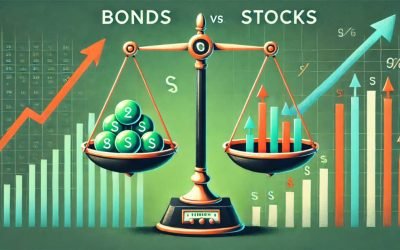Understanding Dividends: A Comprehensive Guide
Dividends are a fundamental aspect of investing in the stock market, yet they are often misunderstood or overlooked by novice investors. This guide aims to demystify dividends, explaining how they work, why companies pay them, and how investors can benefit from them. By the end of this article, you will have a thorough understanding of dividends and how they can play a crucial role in your investment strategy.
Video explaining how dividends work:
What Are Dividends?
Dividends are payments made by a corporation to its shareholders, usually in the form of cash or additional shares. These payments are a way for companies to distribute a portion of their earnings back to investors. Dividends are typically paid on a regular basis, such as quarterly or annually, and are often seen as a sign of a company’s financial health and stability.
Types of Dividends
There are several types of dividends that companies can issue, each with its own characteristics and implications for investors.
- Cash Dividends: The most common type of dividend, paid in cash directly to shareholders.
- Stock Dividends: Additional shares of the company’s stock are distributed to shareholders instead of cash.
- Property Dividends: Rarely used, these dividends are paid in the form of assets other than cash or stock.
- Special Dividends: One-time payments made by a company, often when it has excess cash or during extraordinary circumstances.
How Dividends Are Paid
Dividends are typically paid on a regular schedule, but the process involves several key dates that investors should be aware of:
- Declaration Date: The date on which the company’s board of directors announces the dividend payment.
- Ex-Dividend Date: The date on which new buyers of the stock are not entitled to receive the declared dividend. This date is usually set two business days before the record date.
- Record Date: The date on which the company reviews its records to determine which shareholders are eligible to receive the dividend.
- Payment Date: The date on which the dividend is actually paid to shareholders.
Why Companies Pay Dividends
Companies pay dividends for several reasons, including:
- Attracting Investors: Dividends can make a stock more attractive to investors, particularly those seeking regular income.
- Signalling Financial Health: Regular dividend payments can signal to the market that a company is financially stable and confident in its future earnings.
- Returning Excess Cash: Dividends allow companies to return excess cash to shareholders, rather than reinvesting it in potentially less profitable ventures.
How Dividends Affect Stock Prices
Dividends can have a significant impact on a company’s stock price. When a dividend is declared, the stock price often increases as investors anticipate the upcoming payment. However, on the ex-dividend date, the stock price typically drops by an amount roughly equal to the dividend, reflecting the fact that new buyers are not entitled to the dividend.
Dividend Yield and Payout Ratio
Two important metrics for evaluating dividends are the dividend yield and the payout ratio:
- Dividend Yield: This is calculated by dividing the annual dividend payment by the stock’s current price. It represents the return on investment from dividends alone.
- Payout Ratio: This is the percentage of a company’s earnings that are paid out as dividends. A high payout ratio may indicate that a company is returning most of its earnings to shareholders, while a low payout ratio suggests that it is reinvesting more earnings back into the business.
Reinvesting Dividends
Many investors choose to reinvest their dividends by purchasing additional shares of the company’s stock. This can be done manually or through a Dividend Reinvestment Plan (DRIP), which automatically reinvests dividends into more shares. Reinvesting dividends can lead to compounding returns over time, significantly boosting the overall value of an investment.
Tax Implications of Dividends
Dividends are subject to taxation, and the tax treatment can vary depending on the type of dividend and the investor’s tax situation. In general, cash dividends are considered taxable income, while stock dividends may not be taxed until the shares are sold. It’s important for investors to understand the tax implications of their dividend income and consult with a tax professional if necessary.
Advantages and Disadvantages of Dividend Investing
Investing in dividend-paying stocks has both advantages and disadvantages:
| Advantages | Disadvantages |
|---|---|
|
|
How to Choose Dividend Stocks
Selecting the right dividend stocks requires careful analysis and consideration of several factors:
- Dividend Yield: Look for stocks with a competitive dividend yield, but be cautious of yields that are too high, as they may be unsustainable.
- Payout Ratio: A reasonable payout ratio indicates that the company can sustain its dividend payments while still investing in growth.
- Dividend History: Companies with a long history of consistent or growing dividend payments are often more reliable.
- Financial Health: Evaluate the company’s financial statements to ensure it has strong earnings, cash flow, and a manageable debt level.
Conclusion
Dividends are a powerful tool for investors, providing regular income and the potential for long-term growth through reinvestment. Understanding how dividends work, why companies pay them, and how to evaluate dividend stocks can help you make informed investment decisions and build a robust portfolio. While dividend investing has its challenges, the benefits can be substantial for those who take the time to research and choose their investments wisely.

Q&A Section
- Q: What is a dividend?
A: A dividend is a payment made by a corporation to its shareholders, usually in the form of cash or additional shares, as a way to distribute a portion of its earnings.
- Q: How often are dividends paid?
A: Dividends are typically paid on a regular schedule, such as quarterly or annually, but the frequency can vary depending on the company.
- Q: What is the ex-dividend date?
A: The ex-dividend date is the date on which new buyers of the stock are not entitled to receive the declared dividend. It is usually set two business days before the record date.
- Q: What is a Dividend Reinvestment Plan (DRIP)?
A: A DRIP is a plan that allows investors to automatically reinvest their dividends into additional shares of the company’s stock, often without paying brokerage fees.
- Q: What is the dividend yield?
A: The dividend yield is calculated by dividing the annual dividend payment by the stock’s current price. It represents the return on investment from dividends alone.
Articles for further reading:
Here are a few informative articles that explain how dividends work on the stock market:
- Investopedia provides a thorough explanation of how dividends work, including both cash and stock dividends. It outlines the advantages for investors and companies, such as how dividends can be reinvested to compound returns. The article also details the concept of dividend dilution and how stock dividends affect share prices and earnings per share. This is a great resource for understanding the mechanics and tax implications of dividends (Investopedia).
- NerdWallet offers a beginner-friendly guide on dividends, explaining how they are regular payments made to shareholders from a company’s profits. The article covers the basics of dividend payments, dividend yield, and the importance of considering these when investing. It’s a great resource for those new to dividend investing (NerdWallet: Finance smarter).
- Nasdaq discusses the power of dividends as wealth-building tools, emphasizing the importance of reinvesting dividends over time to maximize returns. It provides real-world examples using historical S&P 500 performance and explains terms like dividend yield, payout ratio, and special dividends (Nasdaq).
- Stash gives a practical overview of how dividends work, focusing on their role in creating passive income. It breaks down the different ways investors can use dividends, such as reinvesting them through dividend reinvestment plans (DRIPs) or cashing them out for immediate income (Stash).
These articles should help you grasp the fundamental concepts of dividends and how they can benefit long-term investors.















 How to trade CFD? (00:49)
How to trade CFD? (00:49) How to trade binary options*? (01:22)
How to trade binary options*? (01:22) Forex. How to start? (01:01)
Forex. How to start? (01:01)